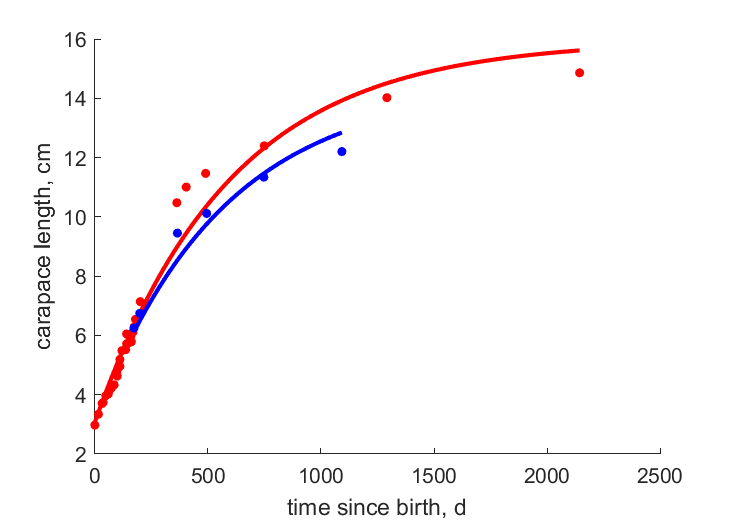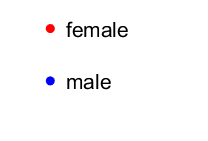Predictions & Data for this entry
| Model: std | climate: Am | migrate: | phylum: |
| COMPLETE = 2.3 | ecozone: TPa | food: biCi, piO | class: |
| MRE = 0.036 | habitat: 0bTd, biFp, biFl, biFr | gender: Dg | order: |
| SMSE = 0.003 | embryo: Tt | reprod: O | family: |
Zero-variate data
| Data | Observed | Predicted | (RE) | Unit | Description | Reference |
|---|---|---|---|---|---|---|
| tp | 730 | 730.6 | (0.00089) | d | time since birth at puberty | Gerl2008 |
| am | 1.716e+04 | 1.715e+04 | (0.0004714) | d | life span | AnGae |
| Lb | 3 | 3.064 | (0.02128) | cm | carapace length at birth | Gerl2008 |
| Li | 15 | 15.96 | (0.06397) | cm | ultimate carapace length | Gerl2008 |
| Wwi | 1233 | 1217 | (0.01273) | g | ultimate wet weight | EoL |
| Ri | 0.0137 | 0.01371 | (0.0009855) | #/d | maximum reprod rate | guess |
Uni- and bivariate data
| Data | Figure | Independent variable | Dependent variable | (RE) | Reference |
|---|---|---|---|---|---|
| tL_f |   | time since birth | carapace length | (0.05121) | Gerl2008 |
| tL_m |   | time since birth | carapace length | (0.04315) | Gerl2008 |
Pseudo-data at Tref = 20°C
| Data | Generalised animal | Pelusios subniger | Unit | Description |
|---|---|---|---|---|
| v | 0.02 | 0.03082 | cm/d | energy conductance |
| p_M | 18 | 34.83 | J/d.cm^3 | vol-spec som maint |
| k_J | 0.002 | 0.002 | 1/d | maturity maint rate coefficient |
| k | 0.3 | 0.4496 | - | maintenance ratio |
| kap | 0.8 | 0.9643 | - | allocation fraction to soma |
| kap_G | 0.8 | 0.8015 | - | growth efficiency |
| kap_R | 0.95 | 0.95 | - | reproduction efficiency |
Discussion
- Males are assumed to differ from females by {p_Am} only
- age at puberty is ignored because it is incosistent with Lp combined with tL data
- mod_1: males have equal state variables at b, compared to females
Bibliography